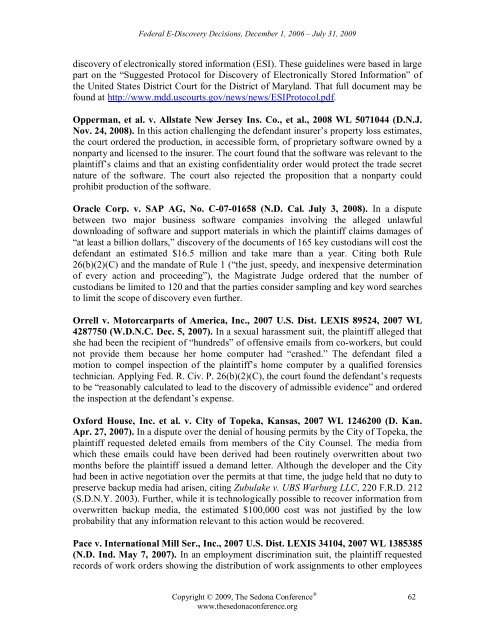Federal Court Decisions Involving Electronic Discovery, December 1 ...
Federal Court Decisions Involving Electronic Discovery, December 1 ...
Federal Court Decisions Involving Electronic Discovery, December 1 ...
Create successful ePaper yourself
Turn your PDF publications into a flip-book with our unique Google optimized e-Paper software.
<strong>Federal</strong> E-<strong>Discovery</strong> <strong>Decisions</strong>, <strong>December</strong> 1, 2006 – July 31, 2009<br />
discovery of electronically stored information (ESI). These guidelines were based in large<br />
part on the “Suggested Protocol for <strong>Discovery</strong> of <strong>Electronic</strong>ally Stored Information” of<br />
the United States District <strong>Court</strong> for the District of Maryland. That full document may be<br />
found at http://www.mdd.uscourts.gov/news/news/ESIProtocol.pdf.<br />
Opperman, et al. v. Allstate New Jersey Ins. Co., et al., 2008 WL 5071044 (D.N.J.<br />
Nov. 24, 2008). In this action challenging the defendant insurer’s property loss estimates,<br />
the court ordered the production, in accessible form, of proprietary software owned by a<br />
nonparty and licensed to the insurer. The court found that the software was relevant to the<br />
plaintiff’s claims and that an existing confidentiality order would protect the trade secret<br />
nature of the software. The court also rejected the proposition that a nonparty could<br />
prohibit production of the software.<br />
Oracle Corp. v. SAP AG, No. C-07-01658 (N.D. Cal. July 3, 2008). In a dispute<br />
between two major business software companies involving the alleged unlawful<br />
downloading of software and support materials in which the plaintiff claims damages of<br />
“at least a billion dollars,” discovery of the documents of 165 key custodians will cost the<br />
defendant an estimated $16.5 million and take mare than a year. Citing both Rule<br />
26(b)(2)(C) and the mandate of Rule 1 (“the just, speedy, and inexpensive determination<br />
of every action and proceeding”), the Magistrate Judge ordered that the number of<br />
custodians be limited to 120 and that the parties consider sampling and key word searches<br />
to limit the scope of discovery even further.<br />
Orrell v. Motorcarparts of America, Inc., 2007 U.S. Dist. LEXIS 89524, 2007 WL<br />
4287750 (W.D.N.C. Dec. 5, 2007). In a sexual harassment suit, the plaintiff alleged that<br />
she had been the recipient of “hundreds” of offensive emails from co-workers, but could<br />
not provide them because her home computer had “crashed.” The defendant filed a<br />
motion to compel inspection of the plaintiff’s home computer by a qualified forensics<br />
technician. Applying Fed. R. Civ. P. 26(b)(2)(C), the court found the defendant’s requests<br />
to be “reasonably calculated to lead to the discovery of admissible evidence” and ordered<br />
the inspection at the defendant’s expense.<br />
Oxford House, Inc. et al. v. City of Topeka, Kansas, 2007 WL 1246200 (D. Kan.<br />
Apr. 27, 2007). In a dispute over the denial of housing permits by the City of Topeka, the<br />
plaintiff requested deleted emails from members of the City Counsel. The media from<br />
which these emails could have been derived had been routinely overwritten about two<br />
months before the plaintiff issued a demand letter. Although the developer and the City<br />
had been in active negotiation over the permits at that time, the judge held that no duty to<br />
preserve backup media had arisen, citing Zubulake v. UBS Warburg LLC, 220 F.R.D. 212<br />
(S.D.N.Y. 2003). Further, while it is technologically possible to recover information from<br />
overwritten backup media, the estimated $100,000 cost was not justified by the low<br />
probability that any information relevant to this action would be recovered.<br />
Pace v. International Mill Ser., Inc., 2007 U.S. Dist. LEXIS 34104, 2007 WL 1385385<br />
(N.D. Ind. May 7, 2007). In an employment discrimination suit, the plaintiff requested<br />
records of work orders showing the distribution of work assignments to other employees<br />
Copyright © 2009, The Sedona Conference ® 62<br />
www.thesedonaconference.org
















